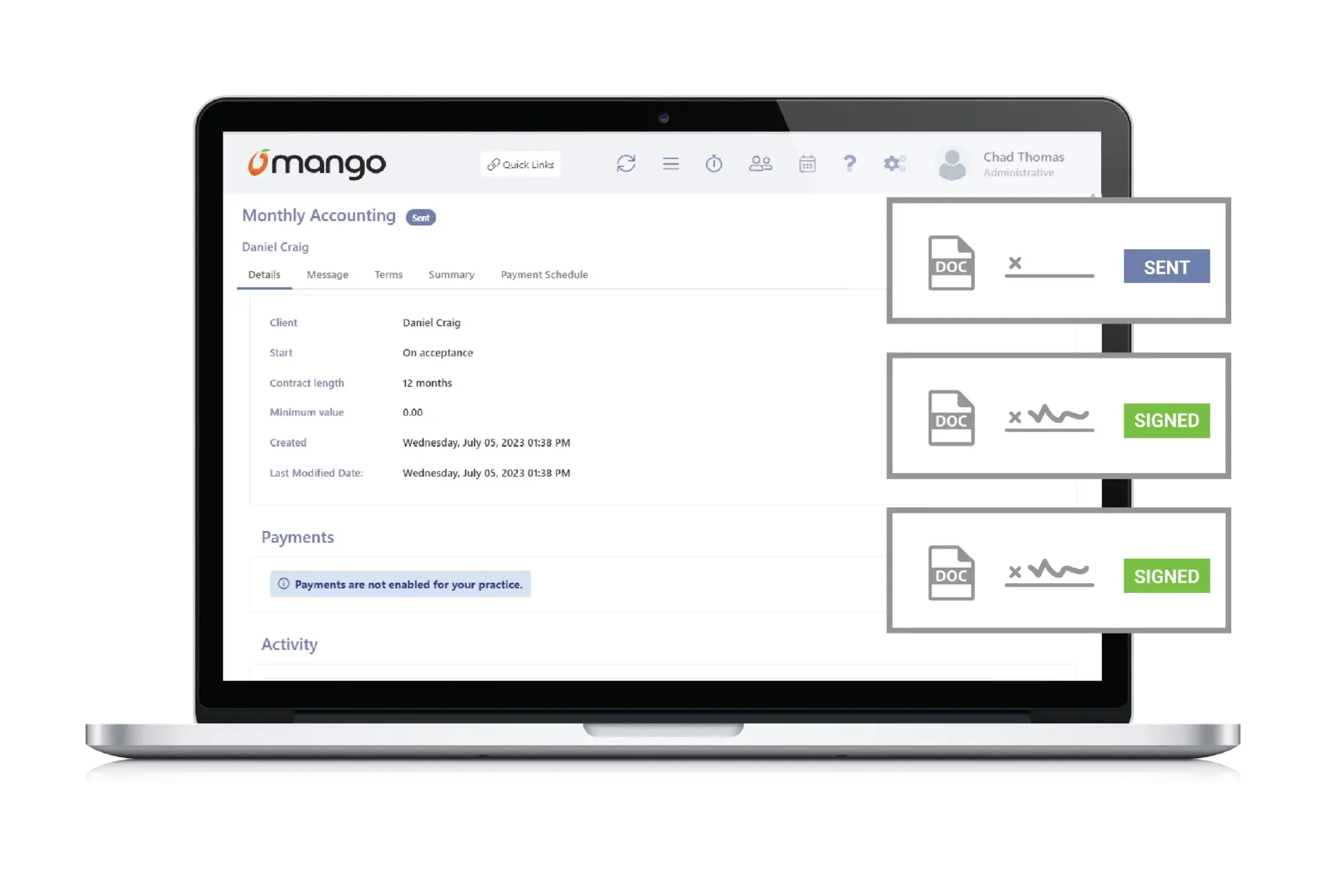Engagement Letter Software for Accountants
Create Engagement Letters in Seconds
It’s never been easier to create legally-binding engagement letters fast. Strengthen client-accountant relationships by clarifying the scope of work and minimizing risk with Mango’s Engagement Letters.

Prevent misunderstandings and conflicts by explicitly defining the scope of services, expectations, and potential limitations.
Despite radical changes in the accounting industry, engagement letters have been a pillar of professionalism and customer satisfaction for decades. Embrace the power of Mango’s engagement letters and embark on a journey toward enhanced efficiency, client satisfaction, and professional excellence. With Mango Practice Management, accountants can navigate the complex landscape of professional engagements with clarity, confidence, and commitment.
With Mango’s Engagement Letters, you will:
- Provide Clarity
- Manage Risk
- Protect Your Firm
- Strengthen Relationships
- Prevent Scope Creep
- Maintain Professionalism
Precision, communication, and accountability are paramount in the fast-paced accounting world. The professional relationships between accountants and their clients are built on a foundation of trust and transparency. Enter the engagement letter — a crucial document that encapsulates the essence of this relationship and defines its terms. For accounting professionals using the Mango Practice Management software, understanding and effectively utilizing engagement letters can transform their operations, enhancing efficiency, professionalism, and client satisfaction.
Definition of an Engagement Letter
An engagement letter, in the context of the accounting profession, is a written document that outlines the terms and conditions of the professional services an accountant or accounting firm will provide to a client. It is a legally binding agreement that establishes the framework for the client-accountant relationship. The engagement letter encapsulates the expectations, responsibilities, and scope of work, ensuring both parties are on the same page from the outset.
The Benefits of Engagement Letters
The need for clear communication in the ever-changing field of financial services should not be overlooked, given the prevalence of sophisticated transactions and complex rules. Engagement letters are a beacon of clarity, fostering a solid foundation for client-accountant relationships. Let’s delve deeper into the benefits of engagement letters, exploring how they contribute to seamless interactions, risk management, legal protection, scope definition, and the embodiment of professionalism.
Clarity and Communication
A clear understanding of roles, responsibilities, and expectations is at the heart of every successful professional engagement. Engagement letters facilitate this understanding by providing a comprehensive overview of the exact services offered.
The detailed description of the scope of work, tasks, and deliverables ensures that the accountant and the client align on the engagement’s objectives. This comprehensive clarity minimizes the risk of miscommunication and assumptions that could derail or compromise the project’s quality. By setting a solid foundation of shared understanding, engagement letters pave the way for effective communication throughout the engagement, enhancing collaboration and rapport.
Risk Management
Misunderstandings are always a possibility in the complex field of financial services. Engagement letters act as a proactive risk management tool by explicitly outlining the limitations and exclusions of services. Addressing potential areas of contention upfront is mitigated by clearly defining what is and is not included in the engagement.
This proactive approach helps mitigate the risk of misunderstandings that could escalate into liability issues or disputes down the road. By acknowledging and addressing potential pitfalls from the outset, engagement letters establish a framework that safeguards the accountant and the client from unintended consequences.
Legal Protection
Legal protection is vital for accountants and clients in an increasingly litigious environment. An engagement letter serves as a legally binding contract that formalizes the terms of the professional relationship. The engagement letter creates a solid foundation for legal recourse in the event of disputes by clearly articulating the engagement’s scope, objectives, and client expectations.
This formal agreement reduces the likelihood of legal conflicts and provides a basis for resolution if disputes do arise. The written record of the engagement letter becomes a critical piece of evidence that can help protect both parties’ interests and rights.
Strengthening Professional Relationships
When clients see that their accountant takes the time to draft a comprehensive engagement letter, it signals a commitment to professionalism and excellence. This dedication to clarity and precision resonates deeply, fostering a sense of trust and mutual respect. Such an authentic display of professionalism acts as a magnet, attracting client loyalty and laying the foundation for enduring and enriching professional relationships that stand the test of time.
Scope Management
One of the most frequent sources of tension in client-accountant relationships is scope creep – the gradual expansion of the project’s scope beyond its original boundaries—engagement letters guardrail against scope creep by explicitly defining the range of services.
Clients gain a clear understanding of what is included in the engagement, preventing them from demanding additional work beyond the initial agreement without appropriate compensation. This ensures that both parties are aligned to the extent of the project, promoting a sense of fairness and transparency.
Professionalism
The presentation of a well-drafted engagement letter is a tangible reflection of the professionalism and commitment of the accountant or firm. It showcases a dedication to clear and transparent communication and a proactive approach to risk management.
By investing reasonable time and effort into constructing a thorough and precise engagement letter, accountants signal their commitment to upholding high professional standards. This commitment reassures clients and underscores the seriousness with which the accountant approaches their role in the financial landscape. The engagement letter becomes a testament to the accountant’s dedication to fostering a positive and productive relationship with clients.
Crafting an Effective Engagement Letter
To ensure that your engagement letters to clients hit all the right marks, Mango Practice Management provides you with a set of guidelines that pave the way for their effectiveness:
- Tailor for different services: Distinct types of engagements require specific details. Customize each engagement letter to reflect the unique services provided, ensuring accuracy and relevance separately.
- Utilize templates and customization: Templates offer a structured foundation for your engagement letters, providing a consistent format to work from. Customization allows you to tailor the content to match the specific details of each client engagement. This pairing ensures efficiency and a personalized touch, creating engagement letters that are both streamlined and uniquely suited to your client’s needs.
- Review and approval process: Before finalizing and sending a solid engagement letter, ensure relevant parties within your firm review it. This step guarantees accuracy, compliance, and alignment with your practice’s standards.


Eliminate Scope Creep with Mango
In the dynamic realm of accounting, the engagement letter stands as a beacon of professionalism, accountability, and transparency. By harnessing the capabilities of Mango Practice Management software, accounting professionals can streamline their engagement letter processes, elevating their practice and fostering strong client relationships.
Mango Practice Management software has e-signature capabilities, advanced data security measures to safeguard your client’s information, and a dedicated client portal. This portal enables clients to submit documents at their convenience, receive timely updates, and access materials like engagement letters from the comfort of their homes.